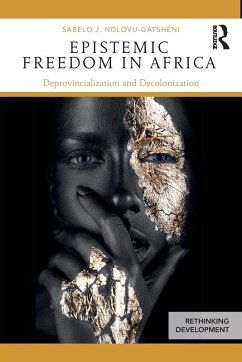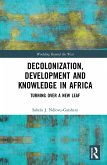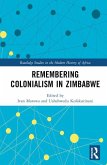Epistemic Freedom in Africa is about the struggle for African people to think, theorize, interpret the world and write from where they are located, unencumbered by Eurocentrism. The imperial denial of common humanity to some human beings meant that in turn their knowledges and experiences lost their value, their epistemic virtue. Now, in the twenty-first century, descendants of enslaved, displaced, colonized, and racialized peoples have entered academies across the world, proclaiming loudly that they are human beings, their lives matter and they were born into valid and legitimate knowledge systems that are capable of helping humanity to transcend the current epistemic and systemic crises. Together, they are engaging in diverse struggles for cognitive justice, fighting against the epistemic line which haunts the twenty-first century.
The renowned historian and decolonial theorist Sabelo J. Ndlovu-Gatsheni offers a penetrating and well-argued case for centering Africa as a legitimate historical unit of analysis and epistemic site from which to interpret the world, whilst simultaneously making an equally strong argument for globalizing knowledge from Africa so as to attain ecologies of knowledges. This is a dual process of both deprovincializing Africa, and in turn provincializing Europe. The book highlights how the mental universe of Africa was invaded and colonized, the long-standing struggles for 'an African university', and the trajectories of contemporary decolonial movements such as Rhodes Must Fall and Fees Must Fall in South Africa. This landmark work underscores the fact that only once the problem of epistemic freedom has been addressed can Africa achieve political, cultural, economic and other freedoms.
This groundbreaking new book is accessible to students and scholars across Education, History, Philosophy, Ethics, African Studies, Development Studies, Politics, International Relations, Sociology, Postcolonial Studies and the emerging field of Decolonial Studies.
The Open Access versions Chapter 1 and Chapter 9, available at https://doi.org/10.4324/9780429492204 have been made available under a Creative Commons Attribution-Non Commercial-No Derivatives 4.0 license.
The renowned historian and decolonial theorist Sabelo J. Ndlovu-Gatsheni offers a penetrating and well-argued case for centering Africa as a legitimate historical unit of analysis and epistemic site from which to interpret the world, whilst simultaneously making an equally strong argument for globalizing knowledge from Africa so as to attain ecologies of knowledges. This is a dual process of both deprovincializing Africa, and in turn provincializing Europe. The book highlights how the mental universe of Africa was invaded and colonized, the long-standing struggles for 'an African university', and the trajectories of contemporary decolonial movements such as Rhodes Must Fall and Fees Must Fall in South Africa. This landmark work underscores the fact that only once the problem of epistemic freedom has been addressed can Africa achieve political, cultural, economic and other freedoms.
This groundbreaking new book is accessible to students and scholars across Education, History, Philosophy, Ethics, African Studies, Development Studies, Politics, International Relations, Sociology, Postcolonial Studies and the emerging field of Decolonial Studies.
The Open Access versions Chapter 1 and Chapter 9, available at https://doi.org/10.4324/9780429492204 have been made available under a Creative Commons Attribution-Non Commercial-No Derivatives 4.0 license.
"Once in a while, a book comes along that enables the rethinking of how we problem-atize both international reality and the discipline of International Relations itself. Epistemic Freedom in Africa: Deprovincialization and Decolonization, by Sabelo Ndlovu-Gatsheni, is such a book. Grounded in a refined understanding of the geopolitics of knowledge production, Ndlovu-Gatsheni uses his book to successfully delineate a sophisticated decolonial theoretical framework. [...] For Ndlovu-Gatsheni, in a world structured by global coloniality, there is no African future without epistemic freedom. Having finished this book, readers will be left with the strong conviction that Sabelo Ndlovu-Gatsheni is an essential intellectual of our time and Epistemic freedom in Africa is a major theoretical contribution to the humanities and social sciences in general, and International Relations in particular." -- Ramon Blanco, International Affairs 96: 5, 2020
"Epistemic Freedom in Africa is truly a breakthrough. Written by an African scholar working in Africa, this book not only offers a devastating critique of Eurocentrism, but it also provides an unsuspected mirror in which much of the social theory produced in the Global North can 'see' the extent of its self-inflicted ignorance. Sabelo's book is a must read both in the Global South and Global North, a very rare achievement." -- Boaventura de Sousa Santos, Professor of Sociology, University of Coimbra, Portugal, and Distinguished Legal Scholar at the University of Wisconsin-Madison, USA
"In a sweeping, analytical and all-encompassing argument - attentive to the work of many predominantly in Africa and Latin America, but also in Europe - Sabelo J Ndlovu-Gatsheni has fired an epistemic and political broadside that will soon become a landmark of the work undertaken by decolonial thinkers and practitioners around the world, and, in turn, a platform for epistemic and political reconstitution." -- Walter D. Mignolo, William H. Wannamaker Professor and Director of Centre for Global Studies and the Humanities, Duke University, USA.
"Sabelo J. Ndlovu-Gatsheni has written a book on the epistemological turn in the movement to decolonize. This African quest is anchored in a serious engagement with a continental and global literature. This book should be essential reading for students who seek to make sense of compulsory curricula and an answer to Marx's old question: who is to educate the educator?" --Mahmood Mamdani, Makerere Institute of Social Research, Uganda & Columbia University, USA
"This erudite, well-argued, and elegantly written book confirms Sabelo J. Ndlovu-Gatsheni's position as one of the principal figures articulating a vision of decolonization and decoloniality for Africa today. In creatively linking African critical thought with other forms of decolonial thinking in the Global South, he effectively challenges existing forms of provincialism in critical theory and area studies, among other fields." --Nelson Maldonado-Torres, Rutgers University, USA
"We, African academics, owe it to our youth, in particular our students, to go beyond the simple denunciation of epistemic coloniality or the demand for epistemic freedom. We need to produce affirmative, positive assertions that lay clear the presence of Africa and Africans in the production of an enlightening and liberating knowledge. By placing education and the African university at the heart of the debate on African futures, Sabelo J. Ndlovu-Gatsheni is leading us in this direction." --Souleymane Bachir Diagne, Columbia University, USA.
"This book, like his previous others, remains among the most serious and radical indictments of both colonialism and postcolonialism. It is indeed a work of good sense and judgement, a sophisticated analysis of the epistemology of the South, and a landmark text in the fields of coloniality and postcoloniality." -- Toyin Falola, The University of Texas at Austin, USA, and Benue State University, Nigeria.
"Epistemic Freedom in Africa is truly a breakthrough. Written by an African scholar working in Africa, this book not only offers a devastating critique of Eurocentrism, but it also provides an unsuspected mirror in which much of the social theory produced in the Global North can 'see' the extent of its self-inflicted ignorance. Sabelo's book is a must read both in the Global South and Global North, a very rare achievement." -- Boaventura de Sousa Santos, Professor of Sociology, University of Coimbra, Portugal, and Distinguished Legal Scholar at the University of Wisconsin-Madison, USA
"In a sweeping, analytical and all-encompassing argument - attentive to the work of many predominantly in Africa and Latin America, but also in Europe - Sabelo J Ndlovu-Gatsheni has fired an epistemic and political broadside that will soon become a landmark of the work undertaken by decolonial thinkers and practitioners around the world, and, in turn, a platform for epistemic and political reconstitution." -- Walter D. Mignolo, William H. Wannamaker Professor and Director of Centre for Global Studies and the Humanities, Duke University, USA.
"Sabelo J. Ndlovu-Gatsheni has written a book on the epistemological turn in the movement to decolonize. This African quest is anchored in a serious engagement with a continental and global literature. This book should be essential reading for students who seek to make sense of compulsory curricula and an answer to Marx's old question: who is to educate the educator?" --Mahmood Mamdani, Makerere Institute of Social Research, Uganda & Columbia University, USA
"This erudite, well-argued, and elegantly written book confirms Sabelo J. Ndlovu-Gatsheni's position as one of the principal figures articulating a vision of decolonization and decoloniality for Africa today. In creatively linking African critical thought with other forms of decolonial thinking in the Global South, he effectively challenges existing forms of provincialism in critical theory and area studies, among other fields." --Nelson Maldonado-Torres, Rutgers University, USA
"We, African academics, owe it to our youth, in particular our students, to go beyond the simple denunciation of epistemic coloniality or the demand for epistemic freedom. We need to produce affirmative, positive assertions that lay clear the presence of Africa and Africans in the production of an enlightening and liberating knowledge. By placing education and the African university at the heart of the debate on African futures, Sabelo J. Ndlovu-Gatsheni is leading us in this direction." --Souleymane Bachir Diagne, Columbia University, USA.
"This book, like his previous others, remains among the most serious and radical indictments of both colonialism and postcolonialism. It is indeed a work of good sense and judgement, a sophisticated analysis of the epistemology of the South, and a landmark text in the fields of coloniality and postcoloniality." -- Toyin Falola, The University of Texas at Austin, USA, and Benue State University, Nigeria.








